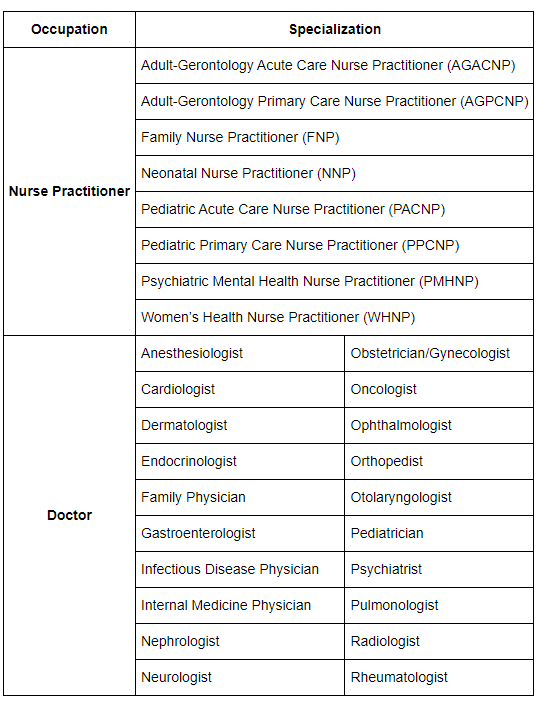Nurse Types / Nurse Practitioner / Nurse Practitioner vs. Doctor
When you immediately think of doctors and nurses, you think of nurses working under the direction of a doctor. In some cases, this is true. Yet, there’s a type of nurse known as the nurse practitioner (NP) who enjoys autonomy and performs many of the same duties as a doctor.
Doctors and nurse practitioners share a significant overlap within their roles as they are both advanced practice providers who provide primary care to patients.
In this post, we will investigate the following:
- What is a nurse practitioner?
- How are the roles of doctors and NPs similar?
- How are the two roles different?
- How do you become a doctor?
- How do you become a nurse practitioner?
- What are the specializations for each role?
- What are the continuing education requirements for each role?
- What is the career outlook for both roles?
What is a nurse practitioner?
A nurse practitioner is a type of advanced practice registered nurse (APRN) who often works autonomously to manage patients’ health care and prevent disease. They must earn a Master of Science in Nursing or Doctor of Nursing Practice (DNP).
Due to their advanced degree, they have a broader level of responsibility and independence than most nurses.
How are the roles of doctors and NPs similar?
Nurse practitioners and doctors share a lot in common. Specifically, these two converge in the following functions:
- Diagnosing and treating acute conditions
- Managing a patient’s overall care as a primary care provider
- Counseling
- Prescribing medications (nurse practitioners are allowed to prescribe in 21 states)
- Designing treatment plans for patients
In total, their day-to-day activities overlap in many ways. The only major thing most nurse practitioners can’t do is perform surgery.
Additionally, nurses and doctors work in similar settings such as hospitals, clinics, and private individual practices.
How are these two roles different?
These two roles differ in the principal focus and underlying philosophy. Nurse practitioners function under the nursing model, while doctors employ the medical model.
The nursing model emphasizes the impact of the diagnosis on the patient. Nurse practitioners must consider the psychosocial impact.
The medical model focuses on the illness or the disease that a patient has. Physicians treat the condition. That is their primary focus.
In many ways, nurses look at the patient holistically while doctors tend to emphasize the disease.
This approach materializes in the nurse’s focus on disease prevention and helping to educate the patient on wellness approaches.
Another difference between doctors and nurses is the prescriptive authority. Doctors can prescribe in all 50 states and D.C., while only 21 states allow nurses full practice authority without the supervision of a doctor.
How do you become a doctor?
Let’s be clear: the path to becoming a doctor is a long one. On average, it takes people between seven and 11 years to become a doctor.
The following list includes the steps to become a doctor:
- Earn a bachelor’s degree: You can earn your bachelor’s degree in any subject. Yet, medical schools have strict rules for the types of prerequisite courses they require.
- Take the Medical College Admission Test (MCAT): Before applying to medical school, you must take this test.
- Graduate from medical school with a Doctor of Medicine (M.D.) degree: This program generally lasts four years and will include the requisite knowledge to complete a residency and work in the field successfully. During the final year of medical school, the student will choose what type of medicine they practice.
- Pass the U.S. Medical Licensing Examination (USMLE): Before you apply for a medical license, you must take and pass the USMLE.
- Complete residency: Resident physicians spend three to seven years training with other healthcare providers and physicians. Their first year of residence is known as the internship.
- Obtain a state license: After completing the residency, the physician must receive their license to practice in the state. The requirements for licensing vary by state.
- Earn a board certification (optional): Physicians have the option of becoming board certified in their chosen specialty.
How do you become a nurse practitioner?
- Become a registered nurse: You must earn a registered nurse license to start a nurse practitioner program. You can earn either an Associate Degree in Nursing (ADN) or Bachelor of Science in Nursing (BSN).
- Accrue experience: Potential nurse practitioners must develop their skills within the field. You want to work as an advanced practice registered nurse to gain as much experience as possible.
- Earn your MSN or DNP: After gaining the necessary skills as a registered nurse, you can start applying for Master of Science in Nursing or Doctor of Nursing Practice programs. The MSN program takes about two years, and there are bridge programs to help you get a DNP degree if you only have a bachelor’s degree.
- Pass the certification exam within your specialty: Each nurse practitioner needs to pick a specialty. This will determine the type of certification exam you will need to take.
- Gain state licensure: Once you pass the exam for your specialty, you need to turn in your results and transcripts to the state to obtain a nurse practitioner license. Some of the conditions require that you apply for prescriptive authority.
In total, it takes nurse practitioners about six years to become eligible for practice. After entering the field, it’s crucial for them to uphold their license and complete continuing education.
What are the specializations for each role?
Both doctors and nurse practitioners have many options when it comes to specializing. Generally, doctors have to spend more time training to specialize, while nurse practitioners don’t have to as much.

Source: https://www.nursingprocess.org/nurse-practitioner-vs-doctor.html.
What are the continuing education requirements for each role?
Both positions require taking continuing education classes as a way to keep licenses up to date, though the requirements are different.
For nurse practitioners, continuing education requirements vary by state. For example, in Washington state, nurse practitioners must complete 30 hours of continuing education every 2 years. Conversely, in New York, there are no requirements for nurse practitioners.
Similarly, the continuing education requirements for doctors vary depending on the state. Some states require yearly renewal and other states are every other year. Additionally, some states don’t have any continuing education requirements while other states are very strict.
What is the career outlook for both positions?
The need for nurse practitioners continues to grow. It’s projected that the role will grow 45% between 2019 and 2029. In 2020, the median base salary for nurse practitioners was $117,670.
The growth for doctors is significantly lower than for nurse practitioners. It’s reported that physicians’ employment will only rise by 4% between 2019 and 2029, which is the average growth rate for all occupations. However, doctors do earn more at $208,000 per year.
If you are a nurse practitioner looking for work, Incredible Health can help you out! Simply sign up and let us help you find the right job for you.
Top nurse jobs on Incredible Health
🏥 Nurse Manager – Emergency Department
Marietta, GA | $60,000 to $100,000 /year
🏥 Nurse Manager – Emergency Department
Palos Heights, IL | $65,000 to $100,000 /year
🏥 Registered Nurse – Home Health
Church Creek, MD | $69,000 to $109,000 /year
🏥 Registered Nurse – Med Surg
Saint Louis, MO | $50,000 to $95,000 /year
🏥 Telemetry Coordinator
Saint Charles, MO | $50,000 to $95,000 /year
Get job matches in your area + answers to all your nursing career questions

